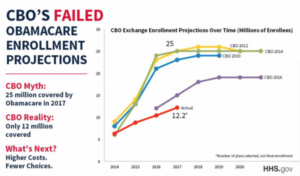Let down the life boats. This ship is sinking.
Obamacare supporters have been denying reality and defying gravity for seven years, but the newest numbers don’t lie. The game is up. The Obamacare exchanges have reached their peak and are now showing unmistakable signs of collapse.
Both the number of willing buyers and the number of willing sellers fell measurably in the federal Affordable Care Act exchange (a.k.a. healthcare.gov) last year, according to new data released today by the federal Department of Health and Human Services (HHS).*

Enrollment: Down
During the 2017 open enrollment period, the number of people signing up for coverage through healthcare.gov dropped for the first time. Sign-ups fell by 400,000.
- 2014 4.2 million people enrolled
- 2015 8.8 million people enrolled
- 2016 9.6 million people enrolled
- 2017 9.2 million people enrolled**
Note: The above figures are not cumulative.***
Insurance Choices: Down
Meanwhile, consumers’ choices are shrinking. The number of insurers offering policies in the federal exchange dropped again this year, continuing a multi-year trend.
- 2015 252 insurers in the federal exchange
- 2016 237 insurers in the federal exchange
- 2017 167 insurers in the federal exchange
Over the past two years the number of insurers in the federal exchange has declined by 28 percent. In the individual market the percentage of enrollees with only one or two issuer options has shot up dramatically:
- 2016 2 percent of enrollees only had one issuer option
- 2017 21 percent of enrollees only had one issuer option
And don’t forget the 17 so-called CO-OPs that have failed due to insolvency, so far, out of 23, total.
Premiums: Up
Average premiums in the federal exchange increased 25 percent in 2016, compared to only 8 percent the year before.****
- 2015 8 percent increase in premiums
- 2016 25 percent increase in premiums
Nationally premiums in the individual market have doubled since 2013.
Thanks, Obamacare!
Bottom Line
Defenders of the ACA will undoubtedly try to dismiss these numbers as a temporary blip or nothing to worry about, or perhaps even try to blame them on President Trump, who has been in office for 14 days. But the warning signs are obvious.
Let down the life boats. This ship is sinking.
Dean Clancy, a former senior official in the White House and Congress, writes on U.S. health reform, budget, and constitutional issues. Follow him at deanclancy.com or on Twitter @deanclancy.
NOTES
* Thirty-nine states use the federal exchange. Eleven states use a state-based exchange. This post is about the federal exchange only. UPDATE, March 16: Finalized numbers for both kinds of exchange offer confirm the thesis of this article:
- 2016 12.7 million people enrolled in state and federal exchanges
- 2017 12.2 million people enrolled in state and federal exchanges
As you can see, total exchange enrollment declined for the first time since the exchanges began operating at the beginning of 2014.
** Update, June 14, 2017: The enrollment figure for 2017, originally reported as 9.2 million in February, and upped to 12.2 million in March, was revised downward in June 2017 to 10.3 million. (This kind of volatility is not unusual.)
*** Three things to be aware of: 1) These federal-exchange figures don’t include enrollments in state-based exchanges. Eleven of the 50 states use a state-based exchange rather than the federal one. If those states are included, the total number of enrollments for 2017 is probably closer to 13 million. 2) A handful of states with state-based exchanges saw increased enrollment for 2017, but they are exceptions to the overall trend. 3) Enrollment figures overstate the actual number of people covered, because a fair number of those who enroll during open season drop their coverage before their first premium payment comes due.
**** These figures are for the second lowest cost silver plan in the exchange. Most comparisons of plans focus on the mid-tier silver plans, which by law must cover about 70 percent of the enrollee’s health costs. Bronze plans cover 60 percent, gold plans 80 percent, and platinum plans 90 percent.
RELATED
